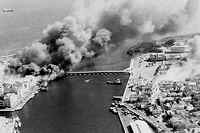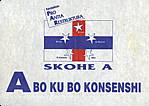
Politics

Kleptocrat Country

Willemstad Burns, May 1969
surrealistic political reality
With continuing anti-imperialism in Holland, and ongoing disinterest for the West Indies, the situation in the Netherlands Antilles grew worse and worse. The economy went to pieces while the unchecked political system grew more and more corrupt.
In the first years after the Statute of the Kingdom had been signed, Curaçao and Aruba, and with those two, the Netherlands Antilles were much richer than the country of Holland. The oil boom was by no means over yet and only started petering out after 1958, when Shell's Isla refinery started automation. However, that loss in income was compensated for by the off-shore industry, where tax treaties enabled a company to open an office in the Antilles, virtually needing not much more than a box-office number, and paying no more than a nominal fee in taxes over their overseas profits.
Those taxes all flew into the Government's coffers, causing it to expand and flower like a triffid. More and more employees were taken on, resulting in an insane bureaucracy: If there was one law our governors didn't manage to break, it was Parkinson's. Party members, if they were not government workers already, routinely got jobs there for having done something in the parties' interests. Voters were openly bought with money, jobs or gifts like refrigerators. Gasoline, electricity and cooking gas were almost free for the asking.
Almost the only thing Holland took any interest in was infra-structure - something that might almost have been invented to stimulate corruption on both sides of the ocean. Money flowed in freely, be it borrowed or as a gift. Development programs were often executed by European companies, so most of the money flew right out again; nobody cared as long as they got their share of the pie.
Meanwhile, unemployment grew and the population steadily grew poorer with it. Dissatisfaction among workers became stronger and stronger. It finally culminated in the infamous 30 May 1969 riots, where a strike ran out of hand and Willemstad burning made the front page of the New York Times. (The guy who took the aerial photo bought a new Cessna soon afterwards.) At first sight, it may seem strange that not the unemployed, but the workers started this strike. You must realize that they were incited by
Papa Godett, leader of the harbor workers' union, compared with whom Rod Steiger in On the Waterfront looks like a babe in arms. The story is that, if you wanted your ship unloaded, you had to pay Godett in person. He is the father of the politician who got a jail sentence in 2004 and his sister, who made it to Prime Minister for a while. No relation to Haïti's infamous
Papa Doc, except in spirit.
After Holland first sent in the Royal Marines to quell the riots and establish order, their later attitude was to leave well enough alone and let Antillean politicians pretty much do as they wanted. And so they did: Things rotted on and on. Education steadily deteriorated. Government and bureaucracy grew like veritable cancers. Finally, the politicians grew so cocksure that they started thinking about complete independence. Their contact with the people was so bad that they thought they would get an overwhelming majority to vote for this.

What's in Store
After a Suriname referendum resulted in their autonomy and Aruba island opted for status aparte in the Kingdom of the Netherlands,
ourpoliticians optimistically thought the Netherlands Antilleans would want independence as well. But in a 1993 referendum they fell flat on their faces when we overwhelmingly voted for continued ties with Holland.
It didn't help us much.
After the 2005 Referendum
Sold and Betrayed

Curaçao Island live in real time
SEARCH this site or the Web

copyright © by
all rights reserved